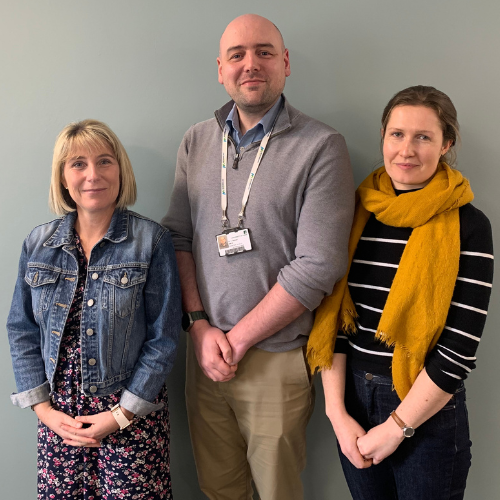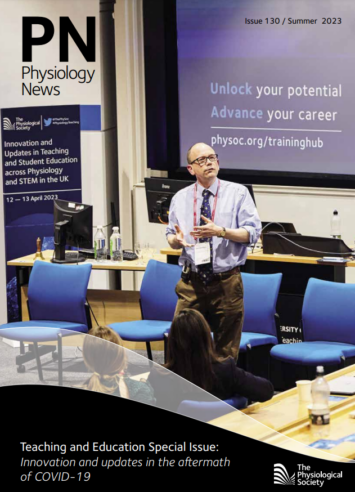
Physiology News Magazine
Guest Editorial: How is higher education changing in the aftermath of the COVID-19 pandemic?
Introduction
Guest Editorial: How is higher education changing in the aftermath of the COVID-19 pandemic?
Introduction

Dr Charlotte Haigh, Dr Ruth Norman and Dr Chris Randall
University of Leeds, UK
Programme organisers for our meeting Innovation and Updates in Teaching and Student Education across Physiology and STEM in the UK that took place at Leeds in April 2023.
The COVID-19 pandemic has heavily influenced higher education, leading to increased opportunities for virtual and remote learning, as well as the traditional face-to-face interactions. Consequently, this has triggered a wave of innovations in student education, such as the use of technology, online resources, and alternative methods of assessment. With these changes, it is imperative that we reflect on our teaching practices, ensuring we meet the learning needs of our diverse student populations, we prepare them to be global citizens, we think carefully about the content in our curriculum design to avoid overload and enable students to gain the most from their assessments by providing valuable and accessible feedback. All of these aspects were discussed at the recent ‘Innovations and Updates in Teaching in Physiology and STEM Education’ symposium held at the University of Leeds, 12- 13 April.
Nicholas Freestone (Kingston University) opened the symposium with the benefits of the levels of data that his institution collects and uses to inform about awarding gaps down to individual assessment pieces. He discussed a variety of interventions aimed at all students such as summer scholarships, which have been shown to increase engagement and decrease awarding gaps in his student cohorts.
A greater appreciation of different cultures and languages will produce global citizens who help promote a better understanding of diverse populations. Pam Birtill (University of Leeds) provided insights into her work with students and staff in understanding what exactly global citizenship means so that appropriate training and resources can be produced to enable the effective instruction and practice of these skills in a modern curriculum.
Teaching core concepts in each subject area remains critical. Instructors should ensure that students have a solid foundation in each discipline’s core concepts, aiding with the advancement of higher learning in that area. Blended learning provides the opportunity for developing courses with core subjects aligned with design-thinking methods. It encourages educators to be innovative in their teaching practices, recognising the importance of encouraging students to think critically. Derek Scott (University of Aberdeen) outlined some key work in this area. Working alongside the American Physiological Society, Derek was pivotal in developing core concepts, but was clear that not all courses need to be able to demonstrate teaching all the core concepts and using a “pick and mix” approach was just as valuable.
The assessment of students remains a critical aspect of all learning, and students require useful feedback that helps them to improve their understanding of studied concepts. Instructors need to provide structured feedback guides that help to evaluate students’ performance. Using a variety of approaches, such as discussion forums, written feedback, audio or video recordings, and rubrics, increases the likelihood of engagement with feedback. As a result, students can learn to identify areas of strength and weakness and use feedback as part of their ongoing self-assessment. Damian Parry (Newcastle University) talked through the pedagogy and then some practical interventions with evidence of positive effects of student engagement with feedback in his discipline.
Innovation plays a crucial role in higher education, with educational institutions ensuring they are innovative in their teaching practices. Instructors must be resourceful and creative, exploring new approaches to teaching and how to engage with all learners effectively. Virtual simulation and web-based technologies coupled with augmented reality and AI make the learning experience immersive and engaging. The flash presentations in this symposium really emphasised the innovative nature of physiology educators and their willingness to be brave and try new things, while maintaining a collaborative design approach so we move forward as a community. Educational institutions and the physiology discipline must embrace innovative strategies to meet new challenges.
The COVID-19 pandemic continues to change higher education, leading to a shift in focus from traditional learning methodologies to optimal blended modalities. As educators, it is essential that we strive to be innovative, adopting new strategies in our teaching practices. By recognising the significance of inclusive teaching, promoting global citizenship, utilising core subject concepts to define the curriculum, and engaging in an active feedback process, we can help to produce students who are prepared for life. Therefore, it is essential and we recommend embracing the new ways of thinking that straddle both the remote and physical worlds, creating educational value that is inclusive, responsive, innovative and promoting meaningful social impact.
